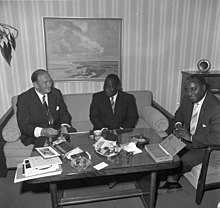Wilhelm Claussen
Wilhelm Claussen (born August 5, 1901 in Husum ; † April 4, 1980 in Niederaula ) was State Secretary in the Federal Ministry of Labor and Social Affairs .
Live and act
As the son of a master shoemaker and dealer, Claussen attended the Hermann Tast Grammar School in Husum. From 1913 to 1920 he was a member of the Wandervogel movement. During this time he met his childhood friend Günther Bergemann , who later became State Secretary in the Federal Ministry of Transport . In 1921 he traveled to Munich to study theology there. Since there were only Catholic faculties in the area, he chose philosophy. After a semester he went to Erlangen and continued his studies in philosophy there. In 1921 he became a member of the Bubenruthia fraternity .
The lecturers Friedrich Brunstäd he obtained in 1924 the doctorate to the Dr. phil. In Berlin-Spandau he taught economics, social insurance and labor law for works councils and union officials from 1924 to 1934 as a lecturer at the Johannis Foundation school. This was followed by an activity as parliamentary secretary for Reinhard Mumm , a member of the Reichstag . From 1926 to 1934 he worked as an editor for the monthly magazine Internationale Rundschau der Arbeit . At the same time he accepted a position in the Berlin branch of the International Labor Office from 1933 to 1936.
From 1934 he also worked as the editor of the intelligence service for foreign social and economic law . In the same year his work as a lecturer at the Johannis Abbey ended because it stopped working. Then he moved to IG Farben in 1937 , where he became head of the economic policy department. He began serving in the Wehrmacht as early as 1939 . In 1942 he was seriously wounded as a lieutenant in the infantry in Russia. This was followed by the protection of his childhood friend Bergemann, the appointment as military supervisory board for the economy in Serbia .
After being a prisoner of war in 1946, through the intercession of his childhood friend, who was the head of the Hamburg Shipping Office, he took on the position of deputy. He worked from 1947 to 1948 as a department head at the head office for maritime transport in the US and British occupation zones. From 1949 to 1951, he was director of the maritime trade associations.
Bergemann brought him to the Federal Ministry of Transport in 1951, where he first worked as a ministerial director , then as a ministerial director. There he last headed the central department until 1957. At the same time he held the post of head of Section A1, which was responsible for personnel, health care and social issues, until 1953. From 1953 to 1957 he was in charge of Section Z1, which was responsible for questions relating to the board of directors of the Federal Railroad, personnel issues for the ministry and the like. a. From 1957 to 1965 he worked as State Secretary in the Federal Ministry of Labor.
During this time, he advocated health insurance reform. This reform largely failed in the next legislative periods. At the same time he turned against the expansion of social security, which included the tendency towards the "supply state". In a parliamentary session before the end of 1958 there was a debate on one of his statements. This consisted of the fact that he had expressed the opinion that the German worker had been overly idealized by social romantics and union officials. In reality he is part of the mass of speculative people who would take advantage of any advantage. Claussen, however, denied having expressed this opinion. In 1966 Ludwig Kattenstroht became his successor.
From 1965 to 1970 he assumed the new position of general representative of the insurance industry associations for economic policy issues. The Great Federal Cross of Merit with Star and Shoulder Ribbon was awarded to him in 1962.
Fonts
- with Otto Ernst: Greater Germany and the World, An ABC of Business in Numbers . Berlin 1938
- Don't rely on Father State - social security today and tomorrow . Oldenburg / Hamburg 1967
literature
- Helge Dvorak: Biographical Lexicon of the German Burschenschaft. Volume I Politicians, Part 1: A – E. Heidelberg 1996, pp. 168-169.
- Walter Habel: Who is who? . Berlin 1962
- Walter Henkels : 99 Bonn heads , reviewed and supplemented edition, Fischer-Bücherei, Frankfurt am Main 1965, p. 62f.
- Hinrich Jantzen: names and works - biographies and contributions to the sociology of the youth movement . Volume 4, Frankfurt / Main 1976
- Hartmut Weber, Michael Hollmann, Uta Rössel and Ralf Behrendt: The cabinet minutes of the federal government . 2001
Web links
- Wilhelm Claussen's curriculum vitae on the website of the Independent Commission of Historians for Research into the History of the Reich Ministry of Labor 1933–1945
| personal data | |
|---|---|
| SURNAME | Claussen, Wilhelm |
| BRIEF DESCRIPTION | German State Secretary in the Federal Ministry of Labor |
| DATE OF BIRTH | August 5, 1901 |
| PLACE OF BIRTH | Husum |
| DATE OF DEATH | April 4, 1980 |
| Place of death | Niederaula |
